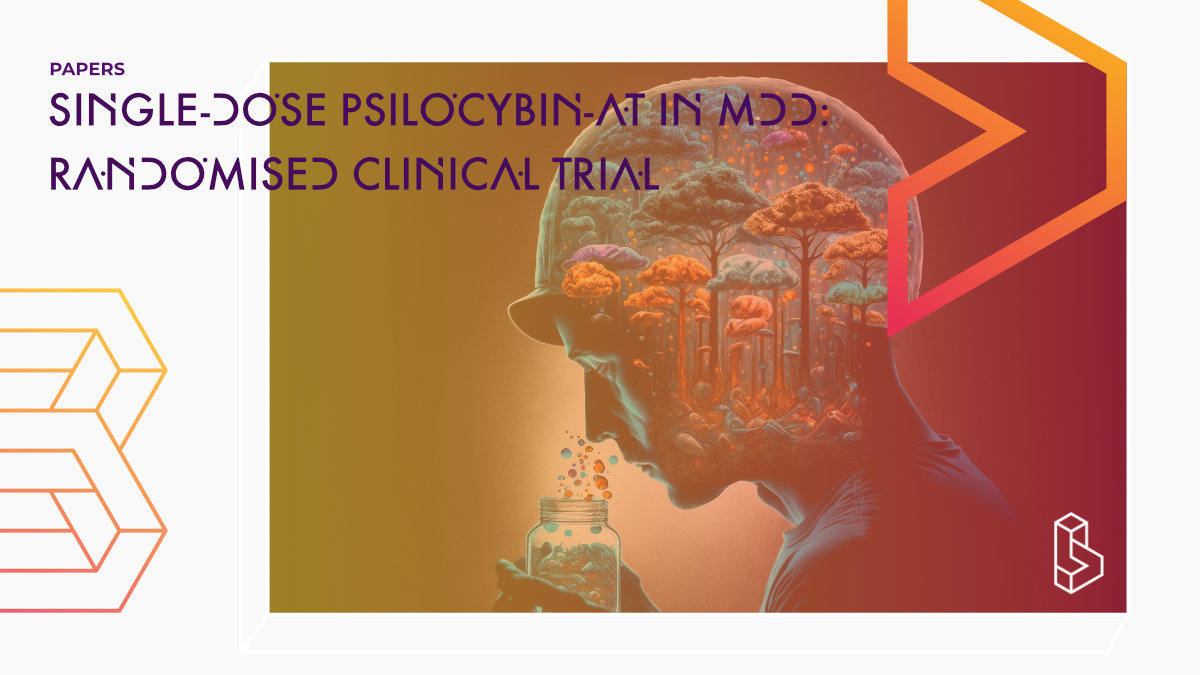This double-blind placebo-controlled study (n=56) found that one psilocybin-assisted therapy (16mg/70kg, 2 prep + 3 integration meetings) session significantly reduced depressive symptoms (MADRS & BDI) in those suffering from a major depressive disorder (MDD, n=26). Fourteen days after the intervention, 54% of those in the psilocybin group met remission criteria (<10 on MADRS).
Abstract
“Background Psilocybin has been suggested as a novel, rapid-acting treatment for depression. Two consecutive doses have been shown to markedly decrease symptom severity in an open-label setting or when compared to a waiting list group. To date, to our knowledge, no other trial compared a single, moderate dose of psilocybin to a placebo condition.
Methods In this double-blind, randomised clinical trial, 52 participants diagnosed with major depressive disorder and no unstable somatic conditions were allocated to receive either a single, moderate dose (0.215 mg/kg body weight) of psilocybin or placebo in conjunction with psychological support. MADRS and BDI scores were assessed to estimate depression severity, while changes from baseline to 14 days after the intervention were defined as primary endpoints. The trial took place between April 11th, 2019 and October 12th, 2021 at the psychiatric university hospital in Zürich, Switzerland and was registered with clinicaltrials.gov (NCT03715127).
Findings The psilocybin condition showed an absolute decrease in symptom severity of −13.0 points compared to baseline and were significantly larger than those in the placebo condition (95% CI −15.0 to −1.3; Cohens’ d = 0.97; P = 0.0011; MADRS) and −13.2 points (95% CI; −13.4 to −1.3; Cohens’ d = 0.67; P = 0.019; BDI) 14 days after the intervention. 14/26 (54%) participants met the MADRS remission criteria in the psilocybin condition.
Interpretation These results suggest that a single, moderate dose of psilocybin significantly reduces depressive symptoms compared to a placebo condition for at least two weeks. No serious adverse events were recorded. Larger, multi-centric trials with longer follow-up periods are needed to inform further optimisation of this novel treatment paradigm.”
Authors: Robin von Rotz, Eva M. Schindowski, Johannes Jungwirth, Anna Schuldt, Nathalie M. Rieser, Katharina Zahoranszky, Erich Seifritz, Albina Nowak, Peter Nowak, Lutz Jäncke, Katrin H. Preller & Franz X. Vollenweider
Summary of Single-dose psilocybin-AT in MDD: RCT
Major depressive disorder (MDD) affects more than 300 million people worldwide, and conventional antidepressants are ineffective. There is a clear need for more effective and rapid-acting antidepressants.
A pilot study and two controlled clinical trials have shown that psilocybin, a preferential serotonin 1A/2A receptor agonist, rapidly and sustainably alleviates depressive symptoms in MDD. However, the primary efficacy endpoint did not reach statistical significance.
Find this paper
https://doi.org/10.1016/j.eclinm.2022.101809
Open Access | Google Scholar | Backup | 🕊
Study details
Compounds studied
Psilocybin
Topics studied
Depression
Study characteristics
Original
Placebo-Controlled
Double-Blind
Randomized
Participants
52
Humans
Authors
Authors associated with this publication with profiles on Blossom
Katrin PrellerKatrin Preller is one of the upcoming researchers, currently at the University of Zurich and Yale University, and is focused on the neurobiology and pharmacology of psychedelics.
Franz Vollenweider
Franz X. Vollenweider is one of the pioneering psychedelics researchers, currently at the University of Zurich. He is also the director of the Heffter (sponsored) Research Center Zürich for Consciousness Studies (HRC-ZH).
Institutes
Institutes associated with this publication
Usona InstituteThe Usona Institute was founded by Bill Linton and Malynn Utzinger. Currently, 18 people are associated with it. The institute is a non-profit that sponsors psilocybin research (and is funded by sponsors/philanthropists).
University of Zurich
Within the Department of Psychiatry, Psychotherapy and Psychosomatics at the University of Zurich, Dr Mialn Scheidegger is leading team conducting psychedelic research and therapy development.
Heffter Research Institute
The Heffter Research Institute has been advancing psychedelics (psilocybin) as medicines since 1993.
Compound Details
The psychedelics given at which dose and how many times
Psilocybin 16 mg | 1xLinked Research Papers
Notable research papers that build on or are influenced by this paper
Psilocybin increases emotional empathy in patients with major depressionThis re-analysis of an RCT (n=51) investigates the effects of psilocybin-assisted therapy on empathy in depressed patients. Participants received either a single psilocybin dose (15mg/70kg) or placebo within a 4-week psychological support programme. Psilocybin significantly improved emotional empathy, particularly towards positive stimuli, for up to two weeks compared to placebo.
Linked Clinical Trial
Clinical, Neurocognitive, and Emotional Effects of Psilocybin in Depressed Patients - Proof of ConceptEffects of serotonin 2A/1A receptor stimulation by psilocybin on mood and emotion processing in major depressive disorder: a randomized double-blind placebo-controlled study

